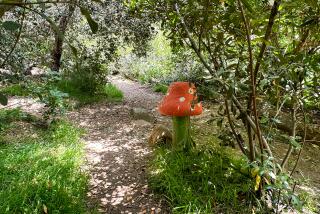Accord Reached in Suit Over Use of Property : Courts: College, nursery operator were at odds about trees and plants she has growing on land owned by the school.
- Share via
A partnership controlled by Pomona College has settled a lawsuit it filed against a 71-year-old nursery owner to compel her to remove hundreds of thousands of trees and bushes from its property.
“It’s a delightful result for everybody,” said Diane C. Stanfield, attorney for the partnership. The settlement calls for a developer to buy $100,000 worth of trees from the nursery and gives the nursery owner up to five years to remove the rest.
Frieda Seyfarth, who owns Seyfarth’s Padua Hills Gardens, was more relieved than delighted by the end of the litigation. “It’s been a nightmare for me,” she said.
With the dispute settled, she is planning to sell her nursery to buyers who will take on the responsibility of moving the plants.
Seyfarth and her late husband, Herman, who was head groundskeeper for Scripps College, established their nursery in the 1950s on 7 1/2 acres on Mt. Baldy Road in northeast Claremont, an area that was then an isolated section of rocks, brush and jack rabbits.
As the nursery’s stock of plants grew, it ran out of room to hold them and the Seyfarths began storing them on neighboring vacant land.
Frieda Seyfarth said there was no objection raised to the storage until a few years ago. But in October, 1988, she received a letter warning her that she had two months to move her trees from the vacant land or they would be considered abandoned. The letter came from the college-controlled partnership, Padova Padua Hills. Pomona College inherited majority ownership of the partnership after the owner of the vacant land bequeathed his share to the college in 1981.
By then, Seyfarth said, she had 2 million trees and bushes, two-thirds of them stored on 17 acres of the neighboring property. Many of the trees had outgrown their boxes and were rooted in the ground.
Meanwhile, neighboring land had become increasingly valuable with tracts of million-dollar homes springing up.
Seyfarth said the deadline she was given to move her trees and bushes was impossible because she had neither the money and means to move them nor a place to put them. In October, 1989, Padova Padua Hills filed suit to compel her to move. She hired a lawyer and filed a cross-complaint, contending that she had acquired a right to the property because her use of it had been uncontested for 20 years or more.
Seyfarth’s attorney, Marjorie Mikels, said her client was being treated unfairly by the property owners. “They are essentially asking the court to kick her off and give them what has taken her 25 years by her toil, labor, resources and life energy to produce,” she said.
The partnership countered that the nursery had taken over its property without permission.
Further complicating the matter, Padova Padua Hills early this year entered into an option agreement to sell its property to the city of Claremont as part of the city’s project to preserve open space.
The city took a three-year option to buy 1,345 acres, including some of the land Seyfarth has been using, for $13 million to $18 million. The city plans to finance the purchase by developing 145 acres of the land as residential property.
The option agreement gave the city the alternative of taking over the lawsuit against Seyfarth or excluding the property she was using. But before the city had to decide, the lawsuit was settled this week.
The settlement was made possible when Seyfarth decided to sell her nursery to owners who have the means to move the trees.






